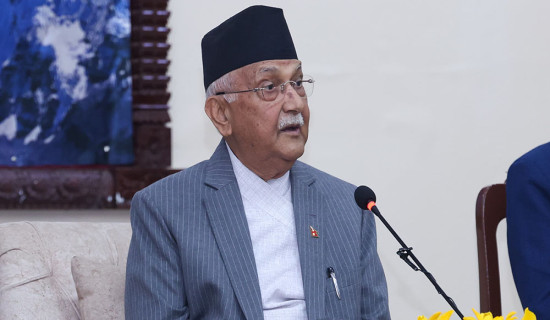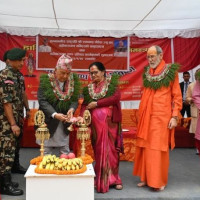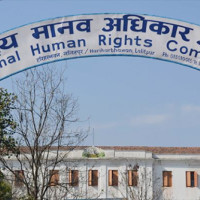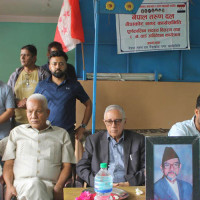- Saturday, 3 May 2025
President unveils govt policies and programmes
Govt aims to achieve rapid economic development
By Modnath Dhakal/Laxman Kafle,Kathmandu, May 3: President Ramchandra Paudel has presented the government’s policies and programmes for the upcoming Fiscal Year 2025/26 with an emphasis on policy stability and the continuation of the current political stability based on healthy competition, cooperation and coexistence.
Presenting the policies and programmes at the joint session of the Federal Parliament on Friday afternoon, President Paudel said that the review of constitution, strengthening of its positive aspects, and its amendment based on consensus are the priority of the government. The amendment to the constitution is expected to rectify the shortcomings seen during its implementation.
There will be efforts to strengthen the constitution and the federal democratic republican system of governance, and to counter any kind of reactionary-revivalist anarchic activities against it, he said.
According to the policy document, the government will further strengthen the programmes operated by government bodies on the development of entrepreneurship, production, productivity, and job creation. "The government will also work to commercialise agriculture and build infrastructure through cooperation, coordination, and collaboration among the three levels of government," said President Paudel.
He also said that the present government was committed to increasing dynamism, controlling corruption and ending impunity.
Centring on the minimum common commitments and priorities of the coalition government made public at the time of the formation of the present government, this government is determined to promote good governance and achieve rapid economic development with a shared resolve, he said.
The government has also announced to stop wasteful expenditure by abolishing, merging and transferring unnecessary structures. "Expanding 'faceless service' to make public service effective and developing the Nagarik App as the main digital tool for providing services and making all possible services online will also be the priority next year," it said.
President Paudel also announced that the respective governments will implement the development programmes under the concurrent list of rights of the federal, provincial, and local levels as mentioned in the constitution in a coordinated manner.
An integrated project bank system will be implemented to eliminate duplication between the federal, provincial, and local levels in development programmes.
The government said that the economy will be revitalised through the implementation of the report of the High-Level Economic Reform and Recommendation Commission.
The policy document emphasised collaboration among the public, cooperative, and private sectors to generate employment opportunities and alleviate poverty. To achieve high, sustainable, and inclusive economic growth, public-private partnerships will be encouraged while maintaining harmony between fiscal and monetary policies, it said.
A business-friendly environment will be created by means of additional policy reforms and procedural simplification for promoting private investment.
Allocative efficiency in public expenditure will be enhanced, with investments focused on high-yield projects, it said. The government has targeted to close, merged and restructured the unnecessary public entities. While keeping recurrent expenditures within desired limit, public sector investments will be focused on complementing and promoting private sector investment.
"The tax system will be structurally transformed with a view to promoting industrialisation, attracting investment, and enhancing the competitiveness of the economy. The policy document states that a taxpayer-friendly revenue system will be developed through reforms in tax administration and the use of information technology," read the document.
It said that development cooperation will be mobilised through the national system in line with development needs and priorities. Foreign investment will be focused on high-return industrial and physical infrastructure projects.
Development cooperation will be mobilised to enhance Nepal's access to climate funds, foster the development of innovative technologies, encourage private sector investment and boost the productivity of the economy.
An Alternative Development Finance Fund will be established to meet project investment needs. The bill related to the operation of the Alternative Development Finance Fund will be passed in the current session of the Parliament.
In alignment with the strategies of the Sixteenth Plan, employment-oriented economic growth and structural transformation will be pursued by implementing information technology, tourism, agriculture, energy, and green industrialisation as foundational sectors, with an emphasis on achieving the Sustainable Development Goals by 2030, said the document.
The LDC Graduation Smooth Transition Strategy will be implemented to facilitate the smooth transition from a least developed country to a developing country by 2026.
Laws related to the expansion of trade agreements, alternative finance, and commodity exchange will be enacted. Private capital will be attracted to potential public infrastructure projects through innovative financial instruments. The Securities Board of Nepal will be strengthened, and Nepal Stock Exchange will be restructured to enhance the capacity and transparency of the capital market.
The Second Financial Sector Development Strategy will also be implemented. An Asset Management Company will be established to manage non-banking assets and non-performing loans of banks and financial institutions.
Information technology infrastructure will be expanded to develop the digital economy and increase cashless financial transactions.
Digital banks will be established by adopting appropriate policy and legal frameworks. Based on studies of their current state, public enterprises will be managed efficiently by means of restructuring, transfer to the private sector, and monetisation through appropriate means.
Insurance services will be made accessible and reliable. Insurance Information Centre will be operationalised while promoting insurance of physical properties. To achieve self-reliance in agricultural produce, subsistence agriculture will be modernised and commercialised through mechanisation and specialisation.
A strong ecosystem of land, agriculture equipment, insurance, purchase agreements, and markets will be developed to attract youths to agriculture.
A pilot project will be launched for aspiring entrepreneurs in any sub-sector of agriculture. The Prime Minister Agriculture Modernisation Project will be restructured and continued as the National Integrated Agriculture Modernisation Programme.
Digital system will be developed to make agricultural services accessible and transparent. Quarantine and laboratory services will be upgraded.
To address the demand for electricity supply, even during the dry season, and to maintain energy security, an appropriate financial model will be adopted for the development of reservoir-based and multipurpose hydropower projects.
National and cross-border high-capacity transmission lines will be expanded in the participation of the private sector.
According to the policy document, efforts will be made to channelise remittances for Nepali citizens working abroad into mega hydropower projects.
The Dhauwadi Iron Company will be operated on a public-private partnership, and sick industries with business potential will be re-operated by adopting appropriate management methods.
The role and scope of the contribution-based Social Security Fund will be expanded so as to mandatorily enrol all employees regardless of the nature and terms of their employment. A legal provision will be introduced requiring companies, institutions, cooperatives, firms, or other organised entities to submit proof of enrolment of employees in and regular contribution to the Social Security Fund while renewing their registration.
A long-term roadmap for governance reform in school education will be prepared, followed by restructuring.
The Bill to amend and consolidate laws related to school education will be passed in the ongoing session of the Parliament. Arrangements will be made to ensure that all children receive basic education by the year 2084 B.S.
The President Education Reform Programme will be revised and strengthened as the National Education Reform Programme.
The government said that scholarship will be provided to the international medal winning sports players and their children for their education.
Tribhuvan University Cricket Ground will be transformed into a cricket ground of modern standards.
Adopting both the preventive and curative methods, all aspects of the medical system will be developed under the 'Healthy Nepal Campaign', said the document.
The government said that intensive burn care and cardiac services will be expanded in all seven provinces.
Cancer and kidney transplant services will be expanded to the provincial level, it said.
The country will be upgraded to a full anti-money laundering complaint country by the year 2083 B.S. by completing all tasks according to the National Strategy and Action Plan on Anti-Money Laundering and Combating the Financing of Terrorism.
Similarly, the government said that the electronic government procurement system (e-GP) will be upgraded to make public procurement result-oriented and effective.
Likewise, strong and balanced international relations will be developed by keeping in mind national independence, sovereignty, territorial integrity, and the paramount interests of the nation and the Nepali people.
The government has also promised to formulate laws relating to cooperatives. While formulating such laws, the distinct identity, autonomy, and self-governance of cooperatives shall be maintained.
It said that an equitable distribution of the benefits of development shall be ensured. Arrangements shall be made for the participation of the backward and economically disadvantaged groups in the opportunities and benefits of development.
"The state shall adopt a policy of providing special opportunities and facilities to the backward communities and economically and socially disadvantaged groups by making special provisions for their education, health, housing, employment, food sovereignty, and social security for their protection, upliftment, and development,"
read the document.
According to the policy document, the government will maintain transparency in the functions of its various bodies. Except for matters of a confidential nature as specified by law, every citizen shall have the right to have access to information about the decisions made by the state and the functions it carries out.
















